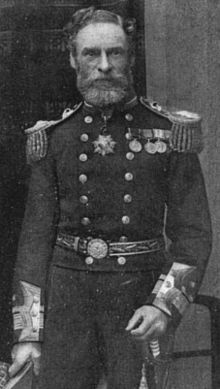Charles Cooper Penrose Fitzgerald
| Charles Cooper Penrose-Fitzgerald | |
|---|---|
 |
|
| Nickname(s) | Rough |
| Born | 30 April 1841 Corkbeg, Ireland |
| Died | 11 August 1921 2 Trinity Road, Folkestone, Kent |
| Allegiance |
|
| Years of service | 1854-1901 |
| Rank | Vice Admiral |
| Other work | author |
Charles Cooper Penrose-Fitzgerald (30 April 1841 – 11 August 1921) was a Vice-Admiral in the Royal Navy.
His father was Robert Uniacke Penrose (1800–1857) who married Francis Matilda Austin, daughter of the Revd Robert Austin, prebendary of Cloyne Cathedral. Charles married Henrietta Elizabeth Hewson on 29 November 1882, daughter of Revd Francis Hewson of Dunganston, Wicklow. They had a son John Uniacke Penrose Fitzgerald (27 July 1888 – 11 December 1940) who also joined the navy and was killed on active service in world war II. In 1896 Charles changed his own surname to Uniacke-Penrose-Fitzgerald.
He was educated at Dr. Burney's academy, Gosport and joined the navy in 1854 onboard HMS Victory at Portsmouth. In 1855 he served in the Baltic and then the Black Sea in 1856. He served on HMS Retribution on the China station and in 1860 on HMS Ariadne.
On 22 May 1861 he was made Lieutenant. On 24 July 1871 he became a commander while serving as first lieutenant on HMS Hercules under Captain Lord Gilford. Was appointed to second in command of HMS Agincourt, flagship of the second division of the Mediterranean squadron, commander Captain Hopkins. Hercules had been involved in the rescue of Agincourt when her previous commander had allowed her to run aground near Gibraltar. He spent three years on HMS Asia, which was an old hulk moored near Fareham. Lord Gilford was once again in command. The posting was a bad one for an officer concerned about his career, but allowed plenty of leave and hunting. The most onerous duty was that he was sometimes called to sit on courts-martial. In the summer he had a small yacht to sail about in the Solent so as not to get out of practice. After Asia he spent a period on half pay and while in Ireland had a bad hunting accident which required him to lie flat for most of a year while recovering.
On 4 January 1878 he was appointed to his first independent command in HMS Rapid in the Mediterranean. Lord Gilford was now a junior Lord of the Admiralty so was able to assist in obtaining the command. Rapid was the slowest ship in the fleet, so was normally used for 'detached' duties. It was fourteen months before Fitzgerald met the squadron commander, Admiral Geoffrey Hornby.
On 19 March 1880 he was promoted to Captain and was appointed to HMS Inconstant, flagship of the flying squadron. Although he wrote on the subject of sailing, he was an advocate of the complete removal of sails from naval vessels (which frequently were equipped with both engines and sails at this time).
...
Wikipedia
